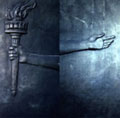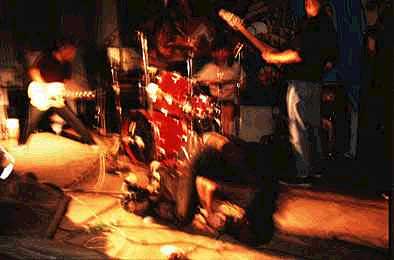|
 In any given year, so many bands come and go that it’s not practical to keep score. For the most part, none of them have any impact, either artistically or economically, and they are finally and deservedly relegated to the bargain bin. In no other place is capitalism’s planned obsolescence as obvious as it is in the music industry. Even well respected acts often get caught in the shuffle. As a result, it is rare to encounter a band that builds a following the old-fashioned way—by releasing well-conceived albums at a moderate pace and playing shows that happen not simply to promote those albums but which are experiences in themselves. It is theoretically possible to do this using conventional means—radio, MTV, a major label, et al. But at what cost? The particular example of Washington, D.C.’s Fugazi, however, presents a case study in the power of grassroots creativity. In any given year, so many bands come and go that it’s not practical to keep score. For the most part, none of them have any impact, either artistically or economically, and they are finally and deservedly relegated to the bargain bin. In no other place is capitalism’s planned obsolescence as obvious as it is in the music industry. Even well respected acts often get caught in the shuffle. As a result, it is rare to encounter a band that builds a following the old-fashioned way—by releasing well-conceived albums at a moderate pace and playing shows that happen not simply to promote those albums but which are experiences in themselves. It is theoretically possible to do this using conventional means—radio, MTV, a major label, et al. But at what cost? The particular example of Washington, D.C.’s Fugazi, however, presents a case study in the power of grassroots creativity.
"Merchandise, it keeps us in line/And common sense says it’s by design"
—"Merchandise" from Repeater, 1990
This past October 15th, Fugazi released The Argument, their eighth full-length album in a series that dates back to 1988. Prior to that year, the members—drummer Brendan Canty, bassist Joe Lally and guitarists/vocalists Ian Mackaye and Guy Picciotto—had been involved in such highly-influential bands as Minor Threat, Rites of Spring and Embrace. All told, their history now spans 21 years. In that time, all of their albums have been released on Mackaye’s (with partner and fellow Minor Threat alum Jeff Nelson) D.C.-based Dischord label, and none of them have been priced higher than $10. Every show they play is all-ages and ticket prices are usually $5, only occasionally a dollar or two more.
Those statistics wouldn’t seem to add up to any kind of longevity, and certainly not to any kind of business success. The conventional wisdom here is that in order to sell records, one has to have some kind of a deal with the devil, however small. Radio, MTV, a major label—these things are considered necessary evils if one wishes to reach a mass audience. Alternately, the thinking goes, maintaining complete integrity will result in personal fulfillment but no kind of real success. Sell out, or nobody will ever know you had anything to sell in the first place.
In point of fact, Fugazi long ago reached the level where they not only confronted that attitude but also dismissed it out of hand. When In on the Kill Taker came out in 1993, the grunge/punk feeding frenzy was at a peak and Fugazi was as hot a commodity as there was. No less an authority than the Washington Post gave them full-feature coverage in anticipation of the boom that was to come. They received an offer that was "so substantial, and presented in such an official way, that it kind of cleared the deck," according to Picciotto. Their refusal of the offer put a stake in the hopes of major labels to land the sweetest plum, but had very little effect on the way the band functions.
 |
It is, however, an admitted challenge for them to make their economy function on such a grand scale. Although exact numbers are not available Fugazi’s records have sold, in total, well over a million copies. They’ve played shows in each of the 50 states, as well as Europe, Australia, South America and Japan. It’s safe to say that you don’t play Idaho, or Brazil, unless a substantial number of people there want to come see you. And at Tower Records on Broadway in New York, as of November 15th, the first shipment of The Argument had sold down to four copies and a second order had been placed, which, in the words of the clerk, means, "It must be selling really well."
Booking extensive tours that are affordable at every stop and releasing and distributing albums with list prices eight dollars cheaper than the majors is not an easy thing to do considering their reach, but they have managed to find a level of functionality that renders the issue moot.
"Check the math here/Check in ten years/Clusterfuck theory/Buy them up and/Shut them down/Then repeat/In every town...Five Corporations/There is a pattern."
—"Five Corporations" from End Hits, 1998
While certainly not the only band to have success on an independent label, Fugazi is a unique case in that they have been particularly successful and have done everything—recording, booking, marketing, distribution, etc.—either by themselves or with the help of a few close friends. They are now at a level where their music is their career and they answer only to themselves, a situation for which most artists would gladly forego instant gratification.
As their scale and reach have expanded, so has their musical intrigue. Starting with Argument and working backward, one sees that Fugazi has developed from a particularly intelligent punk band to a highly experimental unit that defies categorization. Listening now to their first full-length, 13 Songs, there are certainly spots where it sounds dated. But they are easily forgotten next to songs like "Waiting Room" which, in retrospect, serve to illustrate that Fugazi was never content to rest on laurels. By the time Red Medicine was released in 1995, they had already released probably the perfect punk album in Repeater and started to move in an amazing new direction with tracks like "Smallpox Champion" and "Cassavettes," both from In on the Kill Taker. Their past four releases (Red Medicine, End Hits, the Instrument soundtrack and Argument) have each exhibited unprecedented technical mastery, experimentation and diversity.
So how is it that these four men have crafted a significant, international legacy and still maintained adherence to the principles on which they were founded? The answer is deceptively simple: they have done it by placing a high premium on quality work and by maintaining a strict policy of accessibility in their relationship to the people who buy their records and come to see them play. In short, they have taken the DIY ethic of punk and turned it from a vague ideal into a working model.
The two cornerstones of punk have always been accessibility (personal, not necessarily musical) and integrity. Fugazi’s ability to adhere to both of these has allowed them the freedom to create in relative peace, free from the outside influences and pressures of the music industry. Indeed, according to Picciotto, "Whatever pressures we might feel from expectations are dwarfed by the kind of pressure we put on each other." Absent the concerns of an executive panel signing every check, Fugazi are able to live up to each other’s standards—a far higher bar than is set for most bands.
 One unfortunate consequence of all this is a misconception of the band—perpetuated by those accounts that do exist in the mainstream media—that in order to pull it off they maintain an ascetic, snobbish existence. A far different picture emerges in the Jem Cohen documentary Instrument, which Dischord released this November on DVD and came out last year on video. It’s an exhaustive piece of work that covers the band from its inception up until 1998. Worth watching for the live footage alone, it’s the more personal side of the film that provides needed insight into the functional life of the band and the personalities of its members. They are men of great humor, to say the least. One unfortunate consequence of all this is a misconception of the band—perpetuated by those accounts that do exist in the mainstream media—that in order to pull it off they maintain an ascetic, snobbish existence. A far different picture emerges in the Jem Cohen documentary Instrument, which Dischord released this November on DVD and came out last year on video. It’s an exhaustive piece of work that covers the band from its inception up until 1998. Worth watching for the live footage alone, it’s the more personal side of the film that provides needed insight into the functional life of the band and the personalities of its members. They are men of great humor, to say the least.
In one beautifully elucidative moment, drummer Brendan Canty recounts how a man once told his sister that he thought the band members all lived together in a one-room shack somewhere with no heat. A ridiculous notion, to be sure, but one that reflects a widely held idea. The film debunks such myths subtly but effectively and proves that there is nothing strange or mystical about what Fugazi has been able to do. They are, simply put, intelligent guys who love what they do and are only interested in doing it one way.
That’s why they’ve been around for so long, and that’s why they continue to get better.
What comes next is a matter that remains up for some debate. Both Brendan and Joe have young families to tend, a situation that will delay the next major tour until sometime next year. They do not, however, have any intention of stopping. Smart money says that the next album, whenever it comes, will be the most impressive rock record of that year. The spoon-fed PR hounds who actually believe that Dave Matthews or Limp Bizkit are important artistic forces in American music simply can’t comprehend Fugazi’s insistence on quality over quantity. God willing, at this point they won’t start to try.
|